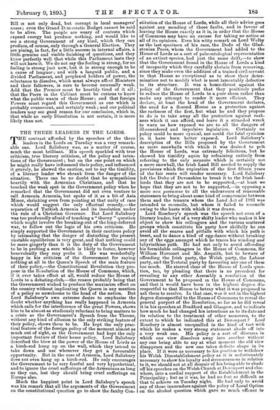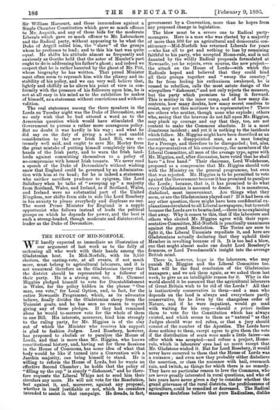THE THREE LEADERS IN THE LORDS. T HE contrast afforded by
the speeches of the three leaders in the Lords on Tuesday was a very remark- able one. Lord Salisbury was, as a matter of course, much the most brilliant. His speech sparkled with true criticism, true literary criticism, of the policy and inten- tions of the Government ; but on the one point on which he might really have influenced their policy, and influenced it gravely, he showed the caution, not to say the timidity, of a literary leader who shrank from the danger of the situation. There can be no doubt that he sympathises heartily with the Armenian Christians, and that he touched the weak spot in the Government policy when he remarked that the Government did not even venture to call Armenia Armenia, but spoke of it as a bit of Asia Minor, shrinking even from pointing at that unity of race which would suggest the only effectual remedy,—the separation of Turkish Armenia and its insulation under the rule of a Christian Governor. But Lord Salisbury was too profoundly afraid of touching a " thorny " question which might involve the breaking-out of the long-deferred war, to follow out the logic of his own criticism. He simply supported the Government in their cautious policy by intimating that the danger of disturbing the present unstable equilibrium is very great, and that nothing could be more gingerly than it is the duty of the Government to be in probing a sore which is likely to fester, however benevolently they may probe it. He was wonderfully happy in his criticism of the Government for saying nothing at all in the Queen's Speech of the main feature of their policy,—the Constitutional Revolution they pro- pose in the Resolution of the House of Commons, which, if it ever takes effect at all, would reduce the House of Lords to a debating-club,—the reason probably being that the Government wished to produce the maximum effect on the country without implicating the Queen in any mention of a policy so unwelcome to the head of the nation. But Lord Salisbury's own extreme desire to emphasise the doubt whether anything has really happened in Armenia which calls for the interference of the great Powers, shows him to be almost as studiously reluctant to bring matters to a crisis as the Government's Speech from the Throne, • without any kind of allusion to the only striking feature of their policy, shows them to be. He kept the only prac- tical feature of the foreign policy of the moment almost as much out of sight, as the Government had kept the only important feature of their home policy. Lord Salisbury described the blow at the power of the House of Lords as a birch-rod hang up on the wall, which they intend to take down and use whenever they get a favourable opportunity. But in the case of Armenia, Lord Salisbury does tot even hang up a birch-rod. He only encourages the Government to be very fearful and very hypothetical, and to ignore the cruel sufferings of the Armenians as long as they can, lest they should bring cruel sufferings on Europe also.
Much the happiest point in Lord Salisbury's speech was his remark that all the arguments of the Government on the constitutional question go to show the faulty Con- stitation of the House of Lords, while all their advice goes against any mending of those faults, and in favour of leaving the House exactly as it is, in order that the House of Commons may have an excuse for taking no notice at all of its opinions. Even his witty remark on Lord Welby as the last specimen of his race, the Dodo of the Glad- stonian Peers, whom the Government had added to the House of Lords as a sort of palmontological representation of an extinct species, had just the same drift,—to show that the Government found in the House of Lords a kind of incapacity which they carefully abstain from removing. since they make even the addition of a trained civil servant to that House so exceptional as to show their deter- mination not to modify what is most lamentably defective in its structure. It was a home-thrust against the policy of the Government that they positively prefer to reduce the House of Lords to a pure sham rather than make any attempt to render it more efficient. They declare, at least the head of the Government declares, the need for a Second House as a protection against the rashness of the first, but what he and they propose to do is to take away all the protection against rash- ness which it can afford, and leave it a stranded wreck to warn us how exposed we are to all the dangers of ill-considered and impulsive legislation. Certainly no policy could be more cynical, nor could the fatal cynicism in it have been better exposed. Lord Salisbury's description of the Bills proposed by the Government as mere snowballs with which it was desired to pelt the House of Lords, was extremely felicitous, but he showed his timidity again by refraining entirely from referring to the only measure which is certainly not a mere snowball, the Irish Land Bill needed to supply the provisions which the expiration of the first fifteen years of the fair rents will render necessary. Lord Salisbury left the Duke of Devonshire to break it to the Irish land- lords that they are not to be supported,—at least we hope that they are not to be supported,—in opposing a mere non possunrus to all the endeavours of reasonable statesmen to bring about some kind of compromise between them and the tenants whom the Land Act of 1881 was intended to reconcile, but whom it failed to reconcile owing to the haste with which it was drawn.
Lord Rosebery's speech was the speech not even of a literary leader, but of a very shifty leader who makes it his object to show his colleagues and the various scattered groups which constitute his party how skilfully he can avoid all the snares and pitfalls with which his path is beset, and to dance a kind of egg-dance without breaking any of the eggs amongst which he traces his winding and labyrinthian path. He had not only to avoid offending his formidable colleagues in the House of Commons, Sir William Harcourt and Mr. Asquith, but to beware of offending the Irish party, the Welsh party, the Labour party, and the Teetotal party by favouring any one of them too much. He steered clear of the House of Lords ques- tion, too, by pleading that there is no precedent for revealing to any other Assembly a resolution of the Government to be proposed in the House of Commons, and that it would have been in the highest degree dis- respectful to that House to betray what it was proposed to ask them to resolve. In that case, was it not in the highest degree disrespectful to the House of Commons to reveal the general purport of the Resolution, so far as he did reveal it in his speeches at Bradford and Glasgow, and to indicate how much he had changed his intentions as to its date and its relation to the treatment of other measures, to the extent to which he indicated this at Devonport ? Lord Rosebery is almost unequalled in the kind of tact with which he makes a very strong statement shade off into a very weak one. His policy is a sort of diorama in which one view dissolves away into another without any one being able to say at what moment the old view disappears and the new one takes definite shape in its place. If it were as necessary to his position to withdraw his Welsh Disestablishment policy as it is unfortunately necessary to show his loyalty and strenuousness in relation to it, we should not at all despair of his being able to shade off his speeches on the Welsh Church at Devonport and else- where, into a cordial support of the Establishment in the Principality ; but as it was, he had no feat so difficult as that to achieve on Tuesday night. He had only to avoid any of those innuendoes against the policy of Local Option on the alcohol question which gave so much offence to Sir William Harcourt, and those innuendoes against a Single Chamber Constitution which gave so much offence to Mr. Asquith, and any of those bids for the moderate Liberals which gave so much offence to Mr. Labouchere and the Radical party, without appearing to be what the Duke of Argyll called him, the " slave " of the groups whom he professes to lead ; and to this his tact was quite equal. He shifts his attitude almost as frequently and anxiously as Goethe held that the actor of Hamlet's part ought to do in addressing his father's ghost ; and indeed we suspect that he is rather haunted by the ghost of Mr. Pitt, whose biography he has written. That proud Minister mast often seem to reproach him with the pliancy and in- stability of his policy, and we can very well believe that, lightly and shiftily as he alters his point of view in con- formity with the pressure of his followers upon him, he is not at all easy in his mind as to the exhibition he makes of himself, as a statesman without convictions and without volition.
The real statesman among the three speakers in the Lords on Tuesday night was the Duke of Devonshire, and we only wish that he had uttered a word as to the Armenian question which would have stimulated the Government to pursue a rather more courageous policy. But no doubt it was hardly in his way ; and what he did say on the duty of giving a sober and candid consideration to the new Irish Land Bill, was ex- tremely well said, and ought to save Mr. Morley from the great mistake of putting himself completely into the hands of the Irish party, and to warn the Irish land- lords against committing themselves to a policy of no-compromise with honest Irish tenants. We never read a speech of the Duke of Devonshire's without wishing anew that England could be governed by an Administra- tion with him at its head ; for he is indeed a statesman who neither sacrifices prudence to epigram, like Lord Salisbury when he talks of "sweeping up" a majority from Scotland, Wales, and Ireland, as if Scotland, Wales, and Ireland were no substantial part of the United Kingdom, nor shifts from side to side like Lord Rosebery in his anxiety to please everybody and displease no one. The worst Prime Minister for England is a supple opportunist who follows instead of leads the political groups on which he depends for power, and the best is such a strong-headed, though moderate and disinterested, leader as the Duke of Devonshire.







































 Previous page
Previous page